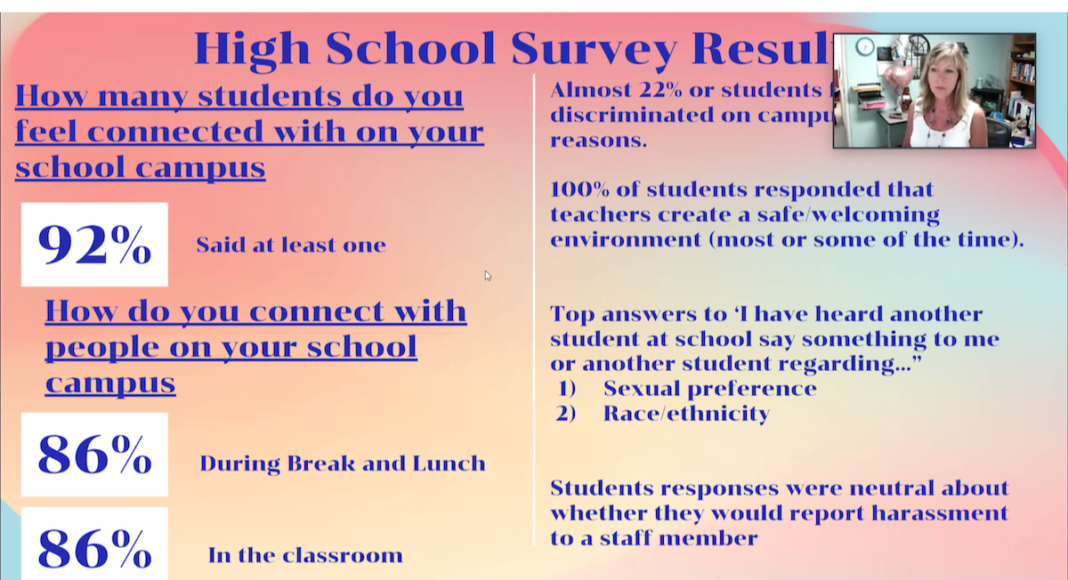The Scotts Valley Unified School District trustees on June 15 heard the results of a student survey that highlighted the nurturing aspects of its learning environment, but also the challenges administrators face in making sure all pupils feel welcome.
The anonymous questionnaire was completed with 4th, 8th and 12th grade students in a classroom setting. It showed that more than 90% of middle and high school students feel “connected with” at least one peer on campus, and 100% of them said teachers create a safe/welcoming environment most or some of the time.
But around 20% of middle and high school students said they felt discriminated against on campus for various reasons.
Through the survey, part of the work of the Cultural Responsiveness Committee, middle school students shared complaints about harassment and inclusivity.
One student wrote that they had “been bullied many times,” but noted, “I don’t want to talk about it to a Google form which will probably be ignored and put into some chart.”
Another respondent said, “I get called slurs due to the color of my skin no matter the situation.”
The survey analyzed “many similar responses” with this concern.
“I would tell kids at school that I am half black and the first question they would ask me would be about the n word,” another middle schooler wrote.
Meanwhile, another shared, “You are all doing a fantastic job as educators; keep doing what you do.”
The top answer to the question “I have heard another student at school say something to me or another student regarding…” for high school respondents was “sexual preference” followed by “race/ethnicity.” It was unclear from the presentation whether these answers were in multiple choice form or volunteered by students. But one parent later commented that they wished the district would use the phrase “sexual orientation” rather than “sexual preference” in its materials.
Elementary students described a joyous school experience, but also said there were problems with name-calling and bullying.
“Our school is so incredibly awesome, safe, fun and respectful (for the most part),” one wrote.
Another shared why they resorted to name calling: “Because I was in a bad mood/was very hurt and needed to let it out,” the student wrote. “Instead of doing it at home or something like that, I got it all out on them, so that they know what it feels like.”
On the topic of how they see themselves, 60% of middle schoolers said they identified with their mental health, compared with 53% who said they identified with their learning ability and 47% who said they identified with their race or ethnicity. In descending order, the middle schoolers said they felt the school is welcoming to students based on gender identity, sexual preference, race or ethnicity, culture and religion, with “learning difference” rated lowest.
“So, learning difference is a concern at the middle school,” Assistant Superintendent of Education Services Michelle Stewart said.
For high schoolers, 65% said they identified with their mental health, 61% identified with sexual orientation, and 62% identified with race/ethnicity.
Students in both high school and middle school were neutral about whether they would report harassment to a staff member.
Stewart pointed to vastly different school experiences reported by various high school students.
“In all honestly, I have never seen or been a victim of hate speech or discrimination at our school,” one wrote.
But another left this response: “There were points where I desired to come out about my identity, but due to the students of the school I was forced to remain in hiding about it.”
One senior said the district needs to listen more.
“Although I am graduating this June,” the commenter submitted, “I would like to request that you give more of a voice to the current and future students as SVHS in order to improve our campus culture.”
The study revealed “many” responses about mental health issues.
“I think that was a surprise to us,” Stewart said.
Superintendent Tanya Krause said, given the surveys were completed in May, the mental health problems could have been connected to the coronavirus pandemic.
“How we asked the questions was really critical,” Krause said. “We really wanted to focus on student voice.”
Board Vice President Michael Shulman said the sutdents may not understand how much progress has been made on discrimination and bullying in recent years.
“These issues have been in our society forever,” he said. “It feels like we’re the tortoise, but I think we’re moving in a way to avoid slip-ups that would set us back.”
Parent Ashley Perlitch said she was pleased to see the district delving into difficult territory, during the public comment period following the presentation.
“I thought the survey was great,” she said, and asked if inclusiveness training was going to happen for sure again.
Krause said the school was planning to continue anti-bias training for staff, educators and parents next year, but that the specific topic had not yet been selected.














